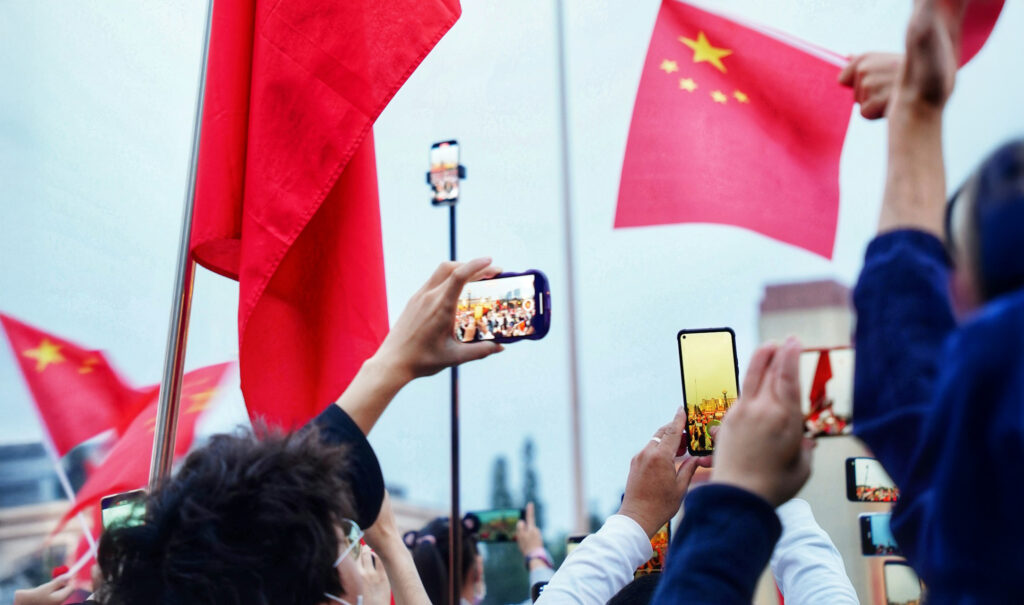A new measure has just ignited a global debate: China prohibits any influencer or content creator from posting about health, law, education or finance without a valid professional accreditation.
Since October 2025, platforms such as Douyin, Weibo, and Bilibili have been required to verify university degrees and licenses before anyone publicly opines on these issues.
China’s commitment to “post-truth” filtering
By: Gabriel E. Levy B.
Over the past two decades, social media has transformed the common citizen into a producer of content. The traditional model of authority based on titles, academic hierarchies and professional experience has been replaced by another: that of influence, virality and instant empathy.
For the new hyperconnected generations, medical advice stopped coming from doctors in white coats to landing in the mouths of teenagers with beauty filters.
Personal finance went from the office of accountants to empirical investors in cryptocurrencies.
China, a country historically centralized in its information management, was no stranger to this phenomenon.
However, its governance model, which is heavily regulated, faced a growing concern: the increase in inaccurate, dangerous or fraudulent content disguised as useful advice.
In this scenario, a law was created that requires influencers to demonstrate their academic training if they wish to speak publicly on topics considered sensitive or of public interest.
The stated intention is to protect the population from misinformation, especially in areas where a bad recommendation can have irreversible consequences.
The Chinese government’s decision did not come out of nowhere.
As early as 2020, restrictions were put in place for live broadcasts on medicine or law, albeit without the current level of documentary requirement.
What is new, now, is the degree of supervision that the platforms must apply.
If an untitled influencer gives advice on anxiety or early childhood education, they may face fines, suspension of their account, or permanent deletion.
And in a society where digital norms are far from symbolic, the move is beginning to have immediate effects.
“All opinion is not knowledge: knowledge demands responsibility”
The context of this law cannot be separated from the global digital ecosystem.
Since the COVID-19 pandemic, millions of people have migrated to non-institutional news content: tutorials, explanatory threads, economic analysis on TikTok or express diagnoses on Instagram.
This trend brought with it a paradoxical phenomenon: greater access to information and, at the same time, greater exposure to misinformation.
Authors such as Lee McIntyre, in his book Post-Truth, explain how objective truth lost relevance in the face of the emotional and the viral.
According to McIntyre, denial of the facts became a political and cultural strategy, rather than an individual error.
In this environment, influencers filled the void left by traditional media and professional figures, creating a new hierarchy of credibility that is not based on titles, but on followers.
China is now responding with a policy that tries to curb this trend.
According to the new regulations, it is not enough to have visibility to talk about mental health or investments; verifiable support is needed.
This measure poses a profound dilemma: does protecting the public imply limiting freedom of expression? Or rather, to restore knowledge to its place of origin?
Researcher Zeynep Tufekci, in her analysis of technology and power, argues that digital platforms shape not only the consumption of information, but also the way we interpret the world.
In that sense, not regulating content is allowing the algorithm to reward the emotional over the true.
From this point of view, the Chinese law, although controversial, seeks to intervene in this perverse circuit.
The Chinese scenario also reflects a political model that prioritizes order over spontaneity.
But it is not only a question of censorship, but of an attempt to re-hierarchize knowledge in an age where anyone can say anything with borrowed authority.
And where an uncorrected error can go viral in minutes.
“The algorithm does not distinguish between advice and consequences”
Several recent cases illustrate the seriousness of the problem.
In 2023, a Shanghai influencer with more than 2 million followers promoted an herbal supplement as a “natural cure” for anxiety.
Despite medical warnings, his video circulated widely and was replicated by other creators.
At least three people reported severe side effects after following their recommendation.
The influencer’s account was suspended, but the content had already been downloaded, shared, and adapted by others.
In the financial field, a young man from Beijing with self-taught training spread advice for investing in cryptocurrencies in the midst of the digital yuan crisis.
Using seductive language and visual tools, he encouraged thousands of followers to buy tokens without legal backing.
Weeks later, several reported losses of up to 80% of their investment. No authority could formally hold him responsible: he did not charge for his advice, but his influence had acted as implicit advice.
There were also alarming cases in education.
A popular creator in Bilibili spread pedagogical theories without academic support, promoting the rejection of formal education and proposing “teaching based on intuition”.
Their videos were followed by young parents who began to unschool their children. The Ministry of Education issued a public warning, but the damage had already been done.
These episodes are no exception.
They are part of a global trend where information deregulation allows anyone, without training or experience, to become a source of guidance for thousands.
Chinese regulation, in this context, does not appear as an authoritarian whim but as a structural response to a real problem: the absence of boundaries between opinion and authority.
A model with lights and shadows
In Latin America and in much of the world, the proliferation of content without professional support on social networks poses an urgent dilemma: how to balance freedom of expression with information responsibility?
Although the right to express an opinion must be safeguarded as an inalienable democratic principle, it cannot be confused with the right to misinform.
The Chinese experience, although extreme in its application model, offers a useful warning: when specialized discourse circulates unfiltered, the risk is no longer only ideological, but health, financial and educational.
Latin America, with its high levels of institutional distrust and intense reliance on the networks as its primary source of information, faces especially fertile ground for disinformation disguised as advice.
It is not a question of censoring the voice of the citizenry, but of demanding that those who massively influence sensitive issues do so with a minimum of demonstrable preparation.
Just as practicing medicine without a license is not allowed, should it not be tolerated that anxiety is diagnosed on a TikTok or investments without training are recommended?
Freedom of expression does not disappear when it is regulated, but when it loses meaning in the face of a tide of statements that do not respond to any evidence or assume responsibility for their consequences.
The Disinformation Industry
Disinformation ceased to be an isolated error or an editorial oversight to become a well-oiled machine for political and commercial purposes. As journalist Mark Fisher revealed in his investigation The Dark Business of Disinformation on Demand, published in the New York Times, today there is a true global ecosystem that sells falsehoods to the highest bidder.
In his report, Fisher narrates how in 2021 an alleged public relations agency offered European influencers significant sums of money to spread messages against the Pfizer-BioNTech vaccine, using meticulously worded documents.
While some rejected the proposal and publicly denounced it, others in countries such as Brazil and India reproduced the messages with surgical precision.
This practice, far from being marginal, responds to what Fisher himself describes as “a hermetic industry whose scale is booming”: private companies that previously only operated in traditional marketing now venture into the field of geopolitical manipulation, using social networks to sow discord, interfere in electoral processes and promote conspiracy theories.
The appeal to clients is clear: these firms offer influence without leaving a footprint. Graham Brookie, from the Atlantic Council’s Digital Forensics Research Lab, confirmed that several governments already contract these services systematically.
In countries such as India, Egypt, Bolivia or Venezuela, disinformation does not come only from radical sectors, but from the government structures themselves. According to a study by the University of Oxford cited by Fisher, in 2020 at least 65 companies operated manipulation campaigns in 48 countries.
In Bolivia, for example, a disinformation network linked to pro-government groups was dismantled, while Stanford investigators linked similar operations in Venezuela and Mexico to the U.S. firm CLS Strategies.
Most disturbingly, this strategy is not limited to election campaigns: many populist leaders institutionalize these practices once they come to power.
The case of India is paradigmatic, where official government accounts have disseminated messages from supposed verification media that actually belong to a private firm dedicated to fabricating news favorable to Prime Minister Narendra Modi.
This trend reveals a worrying pattern: disinformation not only seeks to influence the political present, but to shape reality itself, becoming a new way of governing.
In this scenario, the Cambridge Analytica case was no exception, but the first chapter in an era in which civil liberties and factual truth risk being sacrificed in the name of political expediency and narrative control.
In conclusion
China becomes the first country to require professional accreditation to speak publicly about sensitive topics on social media.
Disinformation is no longer an accident of the digital ecosystem, but a structured, transnational and increasingly sophisticated business model.
From covert operations that use influencers as camouflaged spokespersons, to official government strategies that institutionalize lying as a form of public management, the phenomenon grew in scale and apparent legitimacy. In this new order, information manipulation is sold as a service and consumed as content.
In the face of this, regulating does not mean repressing freedom of expression, but protecting it from its degradation. Countries such as China, although with questionable methods, are already setting a global trend: requiring professional accreditation is not censorship, but a way of restoring knowledge to its weight in the face of the spectacle of unsubstantiated opinion.
Latin America should take note.
In a region where information circulates without filters and institutions are fragile, the disinformation industry represents a real risk to democracy, public health and social cohesion. To ignore it is to surrender to post-truth as a form of government.
References and Citations
Brookie, G. (2025, October 14). Statements quoted in Fisher, M. The dark business of disinformation on demand. The New York Times. Atlantic Council, Digital Forensic Research Laboratory.
Fisher, M. (2025, October 14). The dark business of disinformation on demand. The New York Times. Retrieved from https://www.nytimes.com/2025/10/14/desinformacion-por-encargo.html
McIntyre, L. (2018). Post-Truth. Cambridge, MA: MIT Press.
Tufekci, Z. (2017). Twitter and Tear Gas: The Power and Fragility of Networked Protest. New Haven, CT: Yale University Press.
University of Oxford. (2020). The Global Disinformation Order: 2020 Global Inventory of Organised Social Media Manipulation. Oxford Internet Institute.
Stanford Internet Observatory. (2023). Investigation on CLS Strategies and Coordinated Inauthentic Behavior in Latin America. Stanford University.
Brand. (2025, October 22). Goodbye to ‘experts’ without studies: China will demand degrees…. Retrieved from https://www.marca.com/tecnologia/2025/10/22/adios-expertos-estudios-china-exigira-titulos-influencers-hablen-salud-economia.html
WRadio. (2025, October 17). Influencers in China will be fined if they don’t check…. Retrieved from https://wradio.com.mx/2025/10/17/influencers-en-china-seran-multados-si-no-comprueban-con-titulo-profesional-sus-estudios-para-hablar-en-redes-sociales/
Marketing4eCommerce. (2025, October). China will require influencers to accredit training…. Retrieved from https://marketing4ecommerce.net/china-influencers-formacion/
QuoteDirect Quote. (2025, October). China Requires Social Media Influencers to Have… Retrieved from https://citadirecta.com.ar/noticias/china-exige-que-los-influencers-de-las-redes-sociales-tengan-un-certificado-de-habilidades-antes-de-crear-contenido/66459/
Global World. (2025, October). Regulated in China the role of influencers to ensure the veracity of social media content. Retrieved from https://mundoglobal.org/regulado-en-china-el-papel-de-los-influencers-para-garantizar-la-veracidad-del-contenido-de-las-redes-sociales/



